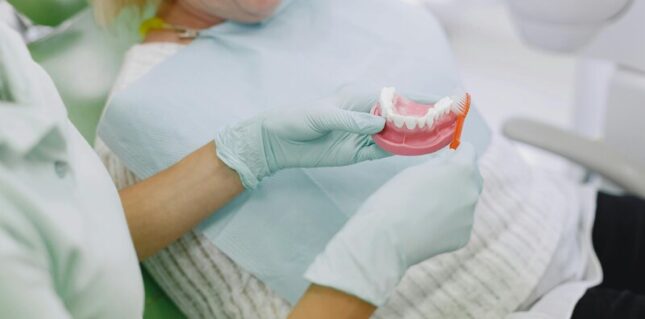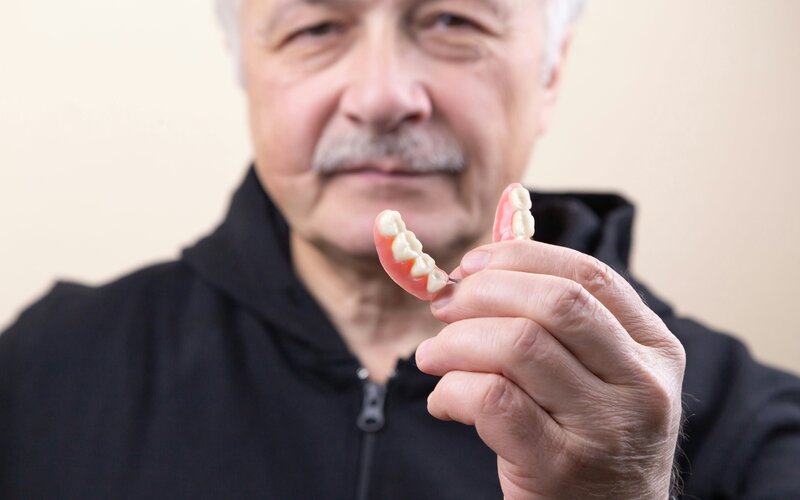Smil, Unit 69-70, Dockside Outlet Shopping Centre, Maritime Way, St Mary's Island, Chatham, ME4 3ED
Smil, Unit 69-70, Dockside Outlet Shopping Centre, Maritime Way, St Mary's Island, Chatham, ME4 3ED

Did you know it’s possible to maintain a bright and healthy smile, even throughout our golden years?
As we age, it’s important to be aware of the oral health issues that can arise and how to prevent them. Neglecting your oral hygiene can lead to various dental problems, affecting your teeth, gums and overall wellbeing.
Our guide to oral care in later life highlights the importance of good dental hygiene in older adults.
Some common dental problems older adults may face include:
Gum disease, also known as periodontal disease, is a common oral health issue among older adults. It occurs when bacteria in plaque irritate the gums, leading to inflammation and infection. Symptoms include swollen, tender or bleeding gums, persistent bad breath and receding gums. If left untreated, gum disease can progress to advanced stages, ultimately resulting in tooth loss.
Despite advancements in dental care, older adults are still susceptible to tooth decay. Receding gums and decreased saliva production can contribute to a higher risk of cavities. Additionally, older adults may have existing dental work, such as fillings or crowns, which can deteriorate over time and increase the likelihood of decay.
Dry mouth is common in older adults, often resulting from medication or medical conditions. Saliva plays a crucial role in maintaining oral health by rinsing away food particles and neutralising acids.
Many older adults rely on dentures to replace missing teeth and restore their smile. However, denture-related issues, such as poor fit and discomfort, can arise if proper care is not maintained. Ill-fitting dentures can also contribute to gum irritation and increase the risk of oral infections.
Tooth sensitivity is a common complaint among older adults, characterised by discomfort or pain when consuming hot, cold, sweet or acidic foods and drinks. It can be a sign of worn tooth enamel, receding gums, cavities or even cracked teeth.

Maintaining good oral health enhances our overall wellbeing and quality of life as we age. By preventing dental issues like gum disease and tooth decay, you can continue to feel comfortable and confident in social situations.
Evidence suggests a strong link between oral health and systemic health conditions, including cardiovascular issues and diabetes. By prioritising your oral hygiene, you can reduce your risk of developing these health issues.
Untreated dental problems can cause significant pain and discomfort. They can impact daily activities such as eating and speaking. By promptly addressing any oral health concerns, you can minimise your discomfort and continue to enjoy your favourite hobbies later in life.
Regular dental check-ups and preventative care help to preserve natural teeth and prevent tooth loss in older adults. By keeping on top of the health of your smile, you can maintain your self-confidence throughout your golden years.
Proper oral function is essential for chewing and digesting food effectively. Good oral hygiene means that you can keep enjoying a varied and nutritious diet, supporting your overall health.
Preventative dental care is often more cost-effective than treating advanced dental problems. By investing in regular check-ups and preventative measures, you can avoid costly and invasive dental procedures in the long run, saving both money and discomfort.
Routine dental visits enable early detection of oral cancer, a potentially life-threatening condition that becomes more common with age. Regular oral cancer screenings allow older adults to receive timely diagnosis and treatment, improving their prognosis and survival rates.
To help maintain your oral hygiene between dental appointments, you should:
1. Brush your teeth with fluoride toothpaste at least twice a day, using a soft-bristled toothbrush and gentle, circular motions to clean all tooth surfaces effectively.
2. Use floss to clean between teeth and along the gumline, removing any plaque and food particles that contribute to gum disease and tooth decay.
3. Rinse your mouth with an antibacterial mouthwash to reduce bacteria and freshen your breath, especially if you experience dry mouth or are prone to gum disease.
4. Stay hydrated by drinking plenty of water throughout the day, as saliva plays a vital role in maintaining oral health and preventing dry mouth symptoms.
5. Limit consumption of sugary foods and drinks, as they can increase the risk of tooth decay and gum disease, particularly in older adults with compromised oral health.
6. Attend regular dental check-ups and hygiene appointments at our practice to monitor your oral health and address any concerns promptly.
7. Clean and maintain your dental prostheses, such as dentures, as instructed by our dentists. Good care and hygiene practices can help extend the lifespan of your dentures and prevent associated oral health issues.
At Smil, we understand just how important dental care is for older adults. As we age, we become more susceptible to oral health issues.
Teeth may weaken due to wear and tear over the years, increasing the risk of decay and fractures. Additionally, age-related factors such as receding gums and medical conditions can exacerbate dental issues. Preventative dentistry, including regular check-ups and early intervention, is essential for maintaining oral health and preserving natural teeth for as long as possible.
Limit or cease smoking and alcohol consumption, as they can contribute to oral health problems, including gum disease, tooth decay and even oral cancer.
Avoid sticky or hard foods that can damage dental prostheses and natural teeth. Opt for softer, nutritious foods that are easier to chew and digest.
Keep your lips moist by applying Vaseline or lip balm regularly, especially if you experience dry mouth.
See our dentists as soon as you notice any signs of oral health issues, such as tooth pain, bleeding gums or changes in the appearance of your mouth. Early intervention can prevent problems from worsening and requiring more extensive treatment.
Although older adults may face more oral health concerns than younger individuals, proactive dental care can help you maintain a bright and healthy smile for years to come. By staying on top of any oral health issues that arise and visiting our practice regularly, you can preserve your natural smile and increase your quality of life.
To find out more about why good oral hygiene is important for older adults, or to book your appointment, please contact our Chatham practice today. Call our friendly team on 01634 756 536 now.
Back to BlogSmil, Unit 69-70, Dockside Outlet Shopping Centre, Maritime Way, St Mary's Island, Chatham, ME4 3ED

